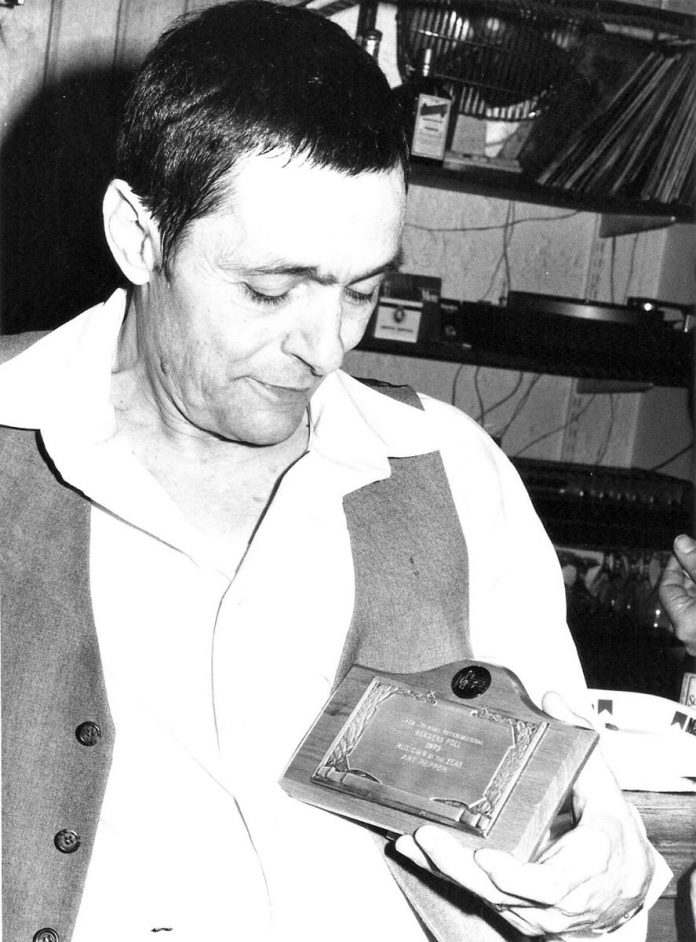Art Pepper is back in the saddle again. After a protracted absence from the New York scene, the altoist brought a quartet into Fat Tuesday’s for a week-long engagement. There were several points which made the tension in the air of the club almost unbearable. First of all, a great many members of the house each night had read “Straight Life” and had been exposed to Art Pepper’s psyche – armed robber, hopeless drug addict, sexual malcontent. There is something peculiarly voyeuristic about watching a man who has so opened himself up – one cannot help picturing the dark-haired horn player in any one of the dozens of peculiar situations described in the book. It is common knowledge now that Pepper considers himself a junkie for life, has never been able to remain on a drug maintenance programme (he’s currently on methadone) and that, as he puts it, “each performance can be my last”. Before the first set, there was a certain buzz in the air and a certain degree of special curiosity.
Pepper plays with his heart and soul, he’s a true player – he doesn’t have the bookish, scholarly sound that is becoming more and more prevalent
Added to this is Pepper’s current album output. His two Galaxy albums are impressive and frequently brilliant and his Contemporary album is at least as good. Now Contemporary has released a live album recorded some years back at the Village Vanguard and Galaxy is about to issue a live set recorded in Japan. There is little doubt that Art Pepper is one of the finest alto players currently working. This, added to the fact that he was working with his own band for the first time – his last stint in the Apple was with a pick-up group with which Pepper was dissatisfied – was more cause for anticipation.
Art Pepper, himself, was frightfully nervous. Like a music student at his first recital, Pepper faced the small audience (the club is small, the audience was capacity) with fear in his eyes. He mumbled a few words and immediately the crowd became hushed – was he going to fall on his face or say something shocking or squeak and squeal on his instrument or what?
Blues For Heard (bassist John Heard) kicked it off. Pepper’s homegrown unit – Carl Burnett on drums, Bob Magnusson on bass, and the powerful Milcho Leviev on piano – was wound like a spring. They were tight and red-hot from the first note, Magnusson giving the rhythm an extra jolt with his firm, walking bass lines, Leviev gliding inside and outside. Pepper, however, was unsure and choppy. His lines were short and meek and he was clearly searching for his footing. On the second tune, Landscape, more a sort of minor blues, he found it.
Pepper began to spark – his phrases were still short, but now they were eerie and effective. Leviev pushed the altoist with heavy-handed block chords and Pepper responded, floating legato phrases off the rhythm. The highlight was a short duo between alto and drums, an enervating and enticing segment. The rest of the evening was on a high level: Caravan displayed Art’s variation on Bird’s bebop philosophies. Pepper plays with his heart and soul, he’s a true player – he doesn’t have the bookish, scholarly sound that is becoming more and more prevalent. He tiptoed around the melody on Over The Rainbow and spat fire on Straight Life, a lightning variation of After You ‘ve Gone. Pepper was roaring, snapping, squeaking, pushing, rollicking and pulling, punctuated by screams and shouts of encouragement by his wife Laurie. The whole performance was distinctive and moving.
After the set, I spoke with Art and Laurie. They were overwhelmed and honoured by Jazz Journal‘s naming Art ”Musician of the Year”.


